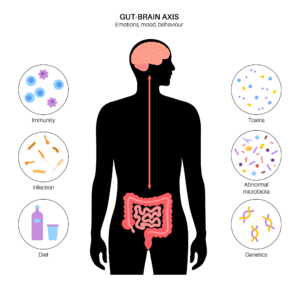How Nutrition and Gut Health Affect Overall Wellness – Explanation from a Long Island Registered Dietitian Nutritionist
THE GUT AXIS
The gut-brain axis and gut-organ axes form a complex, bidirectional communication network between the gut and other organs, primarily facilitated by the gut microbiome. This system operates through the nervous, endocrine, and immune systems, influencing overall health.
Disruptions in gut microbiota can trigger not only gut disorders but also a wide range of health issues. Understanding this science sheds light on the profound connection between diet and well-being, reinforcing the importance of a healthy, individualized nutrition plan for a thriving gut microbiome.
The Gut-Brain Axis
The gut-brain axis is a complex network linking the gastrointestinal (GI) tract and the central nervous system (brain). This bidirectional communication system, driven by nerves and biochemical signals, allows the brain and gut to interact, influencing overall health and well-being.
Components of the Gut-Brain Axis:
- Nerves:
The vagus nerve is the main communication pathway between the gut and brain, transmitting signals about fullness, pain, and inflammation in the GI tract.
- Hormones:
Hormones produced in the gut can influence mood, appetite, and sleep.
- Immune System:
The immune cells in the gut can send messages to the brain, triggering responses to infections or other stressors.
- Microbiota:
The trillions of bacteria, viruses, and other microorganisms in the gut play a crucial role in the gut-brain axis. They produce chemicals that can influence brain function, mood, and immune responses.
The gut-brain axis is important for many functions, including:
- Regulating metabolism:
The gut-brain axis regulates energy balance, glucose levels, and food intake. When you eat, the gut signals the brain about the meal’s size and composition, guiding appetite and metabolism. - Linking gut health to mental health:
Alterations in the gut-brain axis have been linked to psychiatric diseases, such as anxiety, mood disorders, and schizophrenia. - Linking gut health to immune health
- Linking gut health to other parts of the body
Functions of the Gut-Brain Axis:
- Digestion and Metabolism:
The gut-brain axis regulates food intake, digestion, and nutrient absorption. - Mental Health:
The gut microbiota and neurotransmitters produced in the gut can influence mood disorders, anxiety, and depression. - Immune Function:
The gut-brain axis helps coordinate immune responses to injury and disease. - Cognitive Function:
The gut microbiota and neurochemicals can affect learning, memory, and brain health.
The Gut-Organ Axes
The gut-organ axis functions like the gut-brain axis but connects the gut to other organs. This bidirectional communication system, primarily driven by the gut microbiome, operates through the nervous, endocrine, and immune systems to influence overall health.
Disruptions in gut-organ interactions can contribute to chronic disease, highlighting the gut microbiome’s critical role in health. Online medical nutrition therapy can help you cultivate a healthy microbiome, supporting the prevention, management, and reversal of chronic conditions.
The Gut-organ Axis: Establishing the Link Between the Organs
Here are some examples of gut-organ axes:
- Gut-brain
- Gut-pancreas
- Gut-skin
- Gut-hormone
- Gut-reproductive
- Gut-urinary tract
- Gut-muscle
- Gut-liver
- Gut-kidney
- Gut-heart
- Gut-Lung
Promoting Healthy Gut Axes
A healthy microbiome leads to healthy gut-organ axes. Since these microbes live deep within our bodies, they live on what we feed them. Similarly, the amount and diversity of these microorganisms are a result of our diet. They eat what we cannot digest – FIBER.
A Long Island Dietitian’s Recommendations for Foods to Eat for a Healthy Microbiome:
- Eat more fruits and vegetables
- Choose nuts and seeds
- Choose modest quantities of healthful fats
- Add legumes to your diet
- Choose whole grains
- Eat probiotic fermented foods
- Select a variety of foods – diversify
Summary: Real Food, Plant Based, Flexitarian, a Mediterranean style plan
Foods to Avoid:
- Ultra-processed foods
- Saturated Fat
- Trans Fats
Summary: A Western Style Plan
Personalized dietary interventions can help prevent disease and promote physical and mental health.
Through online medical nutrition therapy (MNT), a tailored diet plan can address individual wellness concerns. With over thirty years of experience treating patients in Long Island and around New York, Nancy ensures evidence-based interventions, promoting a healthy and balanced microbiome. Reduce your risk of chronic disease and start to feel better today.


